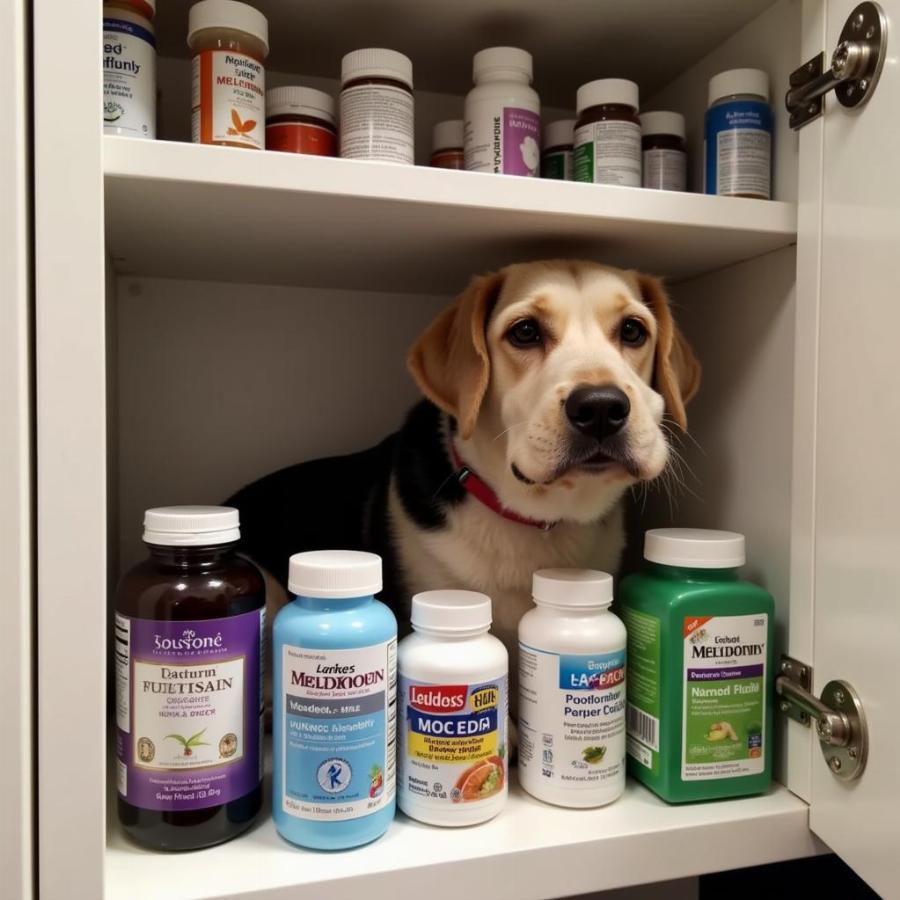Melatonin is a hormone naturally produced in both humans and animals, often used as a sleep aid. But what happens if your dog ate melatonin? This is a concerning situation for many dog owners, and understanding the potential risks and necessary steps is crucial. This article provides a comprehensive guide to managing this situation, covering everything from potential symptoms to when you should seek immediate veterinary care.
Understanding the Risks of Melatonin for Dogs
While melatonin can be beneficial for some dogs under veterinary supervision, ingesting an unsupervised dose can be dangerous. The dosage for dogs is much lower than for humans, and giving your dog human-grade melatonin could lead to an overdose. The concentration of melatonin in human supplements is often much higher than what is safe for dogs. Even small amounts can cause adverse reactions, particularly in smaller breeds or puppies.
What are the potential side effects if a dog ate melatonin? Some common side effects include lethargy, vomiting, diarrhea, increased heart rate, and itching. In more severe cases, it can cause tremors, seizures, and difficulty breathing. If your dog exhibits any of these symptoms after ingesting melatonin, immediate veterinary attention is vital.
What to Do if Your Dog Ate Melatonin
If you discover your dog ate melatonin, don’t panic. First, try to determine how much melatonin your dog consumed. This information will be crucial for your veterinarian. Next, contact your veterinarian or an emergency animal hospital immediately. They can advise you on the best course of action based on your dog’s breed, size, and the amount of melatonin ingested.
They might recommend inducing vomiting or bringing your dog in for observation and treatment. Do not attempt to induce vomiting yourself without veterinary guidance, as this could further harm your dog. Keeping a close eye on your dog for any changes in behavior or the development of symptoms is crucial in the hours following ingestion.
Preventing Melatonin Ingestion in Dogs
Prevention is always better than cure. Store all medications, including melatonin, securely and out of reach of your pet. Childproof containers are often not enough to deter a determined dog. Consider storing medications in locked cabinets or high shelves. Educate family members, especially children, about the importance of keeping medications away from pets.
 Dog Medications Stored Safely in Cabinet
Dog Medications Stored Safely in Cabinet
Can Dogs Take Melatonin Safely?
While unsupervised melatonin ingestion is dangerous, melatonin can be beneficial for some dogs under veterinary guidance. It can help with anxiety, sleep disorders, and certain hormonal imbalances. However, it’s essential to consult your veterinarian before giving your dog any melatonin. They can determine the appropriate dosage and monitor your dog for any adverse reactions.
Frequently Asked Questions
- What if my dog ate only a small amount of melatonin? Even small amounts can be harmful, so contact your vet immediately.
- Can I give my dog melatonin for anxiety? Only under veterinary guidance and with a prescribed dosage.
- How long does it take for melatonin to affect a dog? Effects can appear within 30 minutes to an hour.
- What are the signs of melatonin overdose in dogs? Lethargy, vomiting, diarrhea, increased heart rate, seizures, difficulty breathing.
- Are there any natural alternatives to melatonin for dogs? Discuss natural calming options like zesty paws calming chews for dogs composure with your vet.
- Can I give my dog melatonin and can dogs take gabapentin and melatonin together? Absolutely not without explicit veterinary direction. Combining medications can have unpredictable and dangerous effects.
- Is there something like quiet ears for dogs that could help with anxiety instead of melatonin? While there are products designed to help dogs cope with noise-related anxiety, melatonin should never be a substitute without veterinary approval.
Conclusion
If your dog ate melatonin, immediate action is necessary. Contact your veterinarian or an emergency animal hospital for guidance. While melatonin can be beneficial for dogs under veterinary supervision, unsupervised ingestion can be dangerous. Prevention is key, so always store medications securely and out of your dog’s reach. Remember to consult your veterinarian before giving your dog any medication, including calming for dog aids.
You might also be interested in learning about other medications and their effects on dogs, such as can dogs take xanax.
Beaut Dogs is your trusted source for comprehensive and reliable information on all aspects of dog ownership. For personalized advice and support regarding your dog’s health and well-being, please contact us via Email: [email protected]. We are committed to providing you with accurate and helpful information to ensure your furry friend thrives. Visit us at Beaut Dogs for more expert advice and resources.